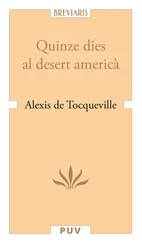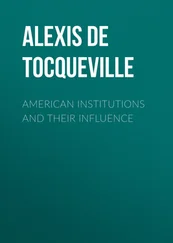Alexis de Tocqueville - Democracy in America - Volume 1
Здесь есть возможность читать онлайн «Alexis de Tocqueville - Democracy in America - Volume 1» — ознакомительный отрывок электронной книги совершенно бесплатно, а после прочтения отрывка купить полную версию. В некоторых случаях можно слушать аудио, скачать через торрент в формате fb2 и присутствует краткое содержание. Жанр: unrecognised, на английском языке. Описание произведения, (предисловие) а так же отзывы посетителей доступны на портале библиотеки ЛибКат.
- Название:Democracy in America - Volume 1
- Автор:
- Жанр:
- Год:неизвестен
- ISBN:нет данных
- Рейтинг книги:4 / 5. Голосов: 1
-
Избранное:Добавить в избранное
- Отзывы:
-
Ваша оценка:
- 80
- 1
- 2
- 3
- 4
- 5
Democracy in America - Volume 1: краткое содержание, описание и аннотация
Предлагаем к чтению аннотацию, описание, краткое содержание или предисловие (зависит от того, что написал сам автор книги «Democracy in America - Volume 1»). Если вы не нашли необходимую информацию о книге — напишите в комментариях, мы постараемся отыскать её.
libreka classics – These are classics of literary history, reissued and made available to a wide audience.
Immerse yourself in well-known and popular titles!
Democracy in America - Volume 1 — читать онлайн ознакомительный отрывок
Ниже представлен текст книги, разбитый по страницам. Система сохранения места последней прочитанной страницы, позволяет с удобством читать онлайн бесплатно книгу «Democracy in America - Volume 1», без необходимости каждый раз заново искать на чём Вы остановились. Поставьте закладку, и сможете в любой момент перейти на страницу, на которой закончили чтение.
Интервал:
Закладка:
Chapter SummaryParties In The United States Chapter XI: Liberty Of The Press In The United States
Chapter SummaryChapter XII: Political Associations In The United States
Chapter SummaryChapter XIII: Government Of The Democracy In America—Part I Chapter XIII: Government Of The Democracy In America—Part II Chapter XIII: Government Of The Democracy In America—Part III Chapter XIV: Advantages American Society Derive From Democracy—Part I Chapter XIV: Advantages American Society Derive From Democracy—Part II Chapter XV: Unlimited Power Of Majority, And Its Consequences—Part I
Chapter SummaryChapter XV: Unlimited Power Of Majority, And Its Consequences—Part II Chapter XVI: Causes Mitigating Tyranny In The United States—Part I
Chapter SummaryChapter XVI: Causes Mitigating Tyranny In The United States—Part II Chapter XVII: Principal Causes Maintaining The Democratic Republic—Part I Chapter XVII: Principal Causes Maintaining The Democratic Republic—Part II Chapter XVII: Principal Causes Maintaining The Democratic Republic—Part III Chapter XVII: Principal Causes Maintaining The Democratic Republic—Part IV Chapter XVIII: Future Condition Of Three Races In The United States—Part I Chapter XVIII: Future Condition Of Three Races—Part II Chapter XVIII: Future Condition Of Three Races—Part III Chapter XVIII: Future Condition Of Three Races—Part IV Chapter XVIII: Future Condition Of Three Races—Part V Chapter XVIII: Future Condition Of Three Races—Part VI Chapter XVIII: Future Condition Of Three Races—Part VII Chapter XVIII: Future Condition Of Three Races—Part VIII Chapter XVIII: Future Condition Of Three Races—Part IX Chapter XVIII: Future Condition Of Three Races—Part X Conclusion
Book One
Introduction
Special Introduction By Hon. John T. Morgan
In the eleven years that separated the Declaration of the Independence of the United States from the completion of that act in the ordination of our written Constitution, the great minds of America were bent upon the study of the principles of government that were essential to the preservation of the liberties which had been won at great cost and with heroic labors and sacrifices. Their studies were conducted in view of the imperfections that experience had developed in the government of the Confederation, and they were, therefore, practical and thorough.
When the Constitution was thus perfected and established, a new form of government was created, but it was neither speculative nor experimental as to the principles on which it was based. If they were true principles, as they were, the government founded upon them was destined to a life and an influence that would continue while the liberties it was intended to preserve should be valued by the human family. Those liberties had been wrung from reluctant monarchs in many contests, in many countries, and were grouped into creeds and established in ordinances sealed with blood, in many great struggles of the people. They were not new to the people. They were consecrated theories, but no government had been previously established for the great purpose of their preservation and enforcement. That which was experimental in our plan of government was the question whether democratic rule could be so organized and conducted that it would not degenerate into license and result in the tyranny of absolutism, without saving to the people the power so often found necessary of repressing or destroying their enemy, when he was found in the person of a single despot.
When, in 1831, Alexis de Tocqueville came to study Democracy in America, the trial of nearly a half-century of the working of our system had been made, and it had been proved, by many crucial tests, to be a government of "liberty regulated by law," with such results in the development of strength, in population, wealth, and military and commercial power, as no age had ever witnessed.
[See Alexis De Tocqueville]
De Tocqueville had a special inquiry to prosecute, in his visit to America, in which his generous and faithful soul and the powers of his great intellect were engaged in the patriotic effort to secure to the people of France the blessings that Democracy in America had ordained and established throughout nearly the entire Western Hemisphere. He had read the story of the French Revolution, much of which had been recently written in the blood of men and women of great distinction who were his progenitors; and had witnessed the agitations and terrors of the Restoration and of the Second Republic, fruitful in crime and sacrifice, and barren of any good to mankind.
He had just witnessed the spread of republican government through all the vast continental possessions of Spain in America, and the loss of her great colonies. He had seen that these revolutions were accomplished almost without the shedding of blood, and he was filled with anxiety to learn the causes that had placed republican government, in France, in such contrast with Democracy in America.
De Tocqueville was scarcely thirty years old when he began his studies of Democracy in America. It was a bold effort for one who had no special training in government, or in the study of political economy, but he had the example of Lafayette in establishing the military foundation of these liberties, and of Washington, Jefferson, Madison, and Hamilton, all of whom were young men, in building upon the Independence of the United States that wisest and best plan of general government that was ever devised for a free people.
He found that the American people, through their chosen representatives who were instructed by their wisdom and experience and were supported by their virtues—cultivated, purified and ennobled by self-reliance and the love of God—had matured, in the excellent wisdom of their counsels, a new plan of government, which embraced every security for their liberties and equal rights and privileges to all in the pursuit of happiness. He came as an honest and impartial student and his great commentary, like those of Paul, was written for the benefit of all nations and people and in vindication of truths that will stand for their deliverance from monarchical rule, while time shall last.
A French aristocrat of the purest strain of blood and of the most honorable lineage, whose family influence was coveted by crowned heads; who had no quarrel with the rulers of the nation, and was secure against want by his inherited estates; was moved by the agitations that compelled France to attempt to grasp suddenly the liberties and happiness we had gained in our revolution and, by his devout love of France, to search out and subject to the test of reason the basic principles of free government that had been embodied in our Constitution. This was the mission of De Tocqueville, and no mission was ever more honorably or justly conducted, or concluded with greater eclat, or better results for the welfare of mankind.
His researches were logical and exhaustive. They included every phase of every question that then seemed to be apposite to the great inquiry he was making.
The judgment of all who have studied his commentaries seems to have been unanimous, that his talents and learning were fully equal to his task. He began with the physical geography of this country, and examined the characteristics of the people, of all races and conditions, their social and religious sentiments, their education and tastes; their industries, their commerce, their local governments, their passions and prejudices, and their ethics and literature; leaving nothing unnoticed that might afford an argument to prove that our plan and form of government was or was not adapted especially to a peculiar people, or that it would be impracticable in any different country, or among any different people.
Читать дальшеИнтервал:
Закладка:
Похожие книги на «Democracy in America - Volume 1»
Представляем Вашему вниманию похожие книги на «Democracy in America - Volume 1» списком для выбора. Мы отобрали схожую по названию и смыслу литературу в надежде предоставить читателям больше вариантов отыскать новые, интересные, ещё непрочитанные произведения.
Обсуждение, отзывы о книге «Democracy in America - Volume 1» и просто собственные мнения читателей. Оставьте ваши комментарии, напишите, что Вы думаете о произведении, его смысле или главных героях. Укажите что конкретно понравилось, а что нет, и почему Вы так считаете.












